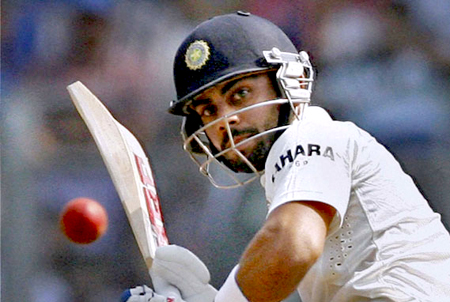 Jul 2: "I could probably look to bat anywhere, but the team wanted me to be at No. 4 all the time and that's where I've spent most of my career, right from the Under-15 days. It was probably the main number for the team and that's where the management wanted me to be for a long time. With time that became my favourite number."
Jul 2: "I could probably look to bat anywhere, but the team wanted me to be at No. 4 all the time and that's where I've spent most of my career, right from the Under-15 days. It was probably the main number for the team and that's where the management wanted me to be for a long time. With time that became my favourite number."
That was Virat Kohli in 2010, speaking to this writer about his preference for the No. 4 spot in all forms of the game. Nearly four years on, Kohli is India's best batsman, captain-in-waiting and, for determination and sheer ability to overcome the obstacles, the man who will become India's most famous batsman at two-down since Sachin Tendulkar. And now, in the post-Tendulkar era, Kohli has embarked on his biggest and longest tour - five Tests in England.
And they present Kohli his biggest challenge as a Test cricketer. Why? Because he has not played first-class cricket in England; because he will be faced with a challenge seen yet faced so frequently in tough conditions - the swinging Dukes ball; because he will be targeted by England's battery of fast bowlers; because he will have to maintain his focus and consistency across five Test matches. It is both soothing and scary to imagine what can be achieved over the next six weeks.
Kohli is many things when at the crease: calm, patient, strong, optimistic, assured. Traits that have made him visually seductive from the time he struts to the crease, takes guard, surveys the field from under that thick brow, adjusts his helmet, protrudes his jowl. He is special, in possession of that aura of once-in-a-generation specialness. The hunger is unmistakable.
At 25, he has reached a stage where only one other Indian, Tendulkar, was at the same age - a superstar. He has shown that he can manage the expectations and repay the faith, as some outstanding ODI centuries have proven in the last few years. In Tests, Johannesburg last December and Wellington were exemplary innings of what Kohli can do in whites.
Since making his Test debut in the West Indies four years ago he has made rapid strides, with the 2011-12 tour of Australia confirming he could play Test cricket. His first century was in the fourth Test of the dismal 4-0 whitewash, and it was the only one that the touring Indians could manage. That tour (300 runs at 37.50) ensured Kohli his place in the Test line-up and he has not missed a game since, scoring - since the Adelaide Test of January 2012 - 1230 runs from 26 innings at 55.90, with five hundreds and six fifties.
Along the way, he has rapidly narrowed the bridge separating knowledge from wisdom. Now, against a hurting England team fully capable of exposing their conditions - remember 2011? - Kohli must rise to the occasion of combating quality pace, swing and seam in England. He can, make no mistake of that.
Which brings us to the uniqueness of this series: five Tests. Say it again. It is a thing of rare beauty. All we can do is pinch ourselves at the fact that we will be watching an Indian cricket team contest five Tests in England. It promises to be a treat.
What the likes of Ajinkya Rahane and Rohit Sharma stand to gain from this rare opportunity is immense. So you fail in one Test. You have four to pick yourself up. In a two-Test series - they should be banned - if you fail in one and get dropped, that could be doom. Across five, there are far more chances that you will be given a longer rope or, if discarded early on, find yourself back in. Can you imagine the hunger in Cheteshwar Pujara's belly at knowing that he has five Test matches in one country and against one opponent to continue his awesome rise as a Test cricketer?
On and off the field, this summer of Test cricket in England promises to be a learning curve for several of India's young batsmen. In particular, for the one whose favourite position is fourth.





Comments
Add new comment